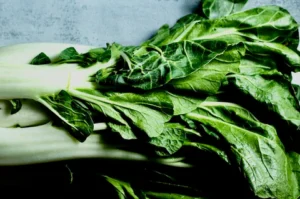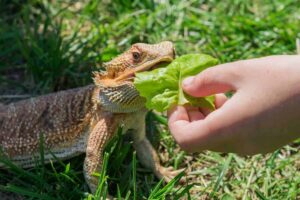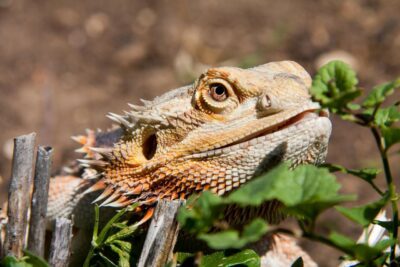Curious about what’s on the menu for your scaly friend? Let’s talk about something that might catch your bearded dragon’s eye: bok choy. Can bearded dragons eat bok choy? It’s a question that might pop up when you’re trying to diversify their diet.
Yes, bearded dragons can eat bok choy. Bok choy, a type of Chinese cabbage, can be a healthy addition to your bearded dragon’s diet when offered in moderation. It provides essential nutrients such as vitamins A, C, and K, as well as calcium and fiber.
However, like with any new food, it’s important to introduce bok choy gradually and observe how your bearded dragon reacts to it. Some beardies may enjoy munching on bok choy, while others may not show much interest. As always, variety is key to providing a balanced diet for your pet, so feel free to offer bok choy alongside other greens and vegetables suitable for bearded dragons.
Can Bearded Dragons Eat Bok Choy?

Bok choy, also known as Chinese cabbage, is a great addition to a bearded dragon’s diet due to its nutritional value. It contains essential vitamins and minerals such as vitamin A, vitamin C, vitamin K, calcium, and potassium, which are important for your pet’s overall health.
When feeding bok choy to your bearded dragon, it’s crucial to prepare it properly. Here are some tips:
- Chop it finely: Bearded dragons have small mouths and can have difficulty chewing large pieces of food. Chop the bok choy into small, manageable pieces to make it easier for your pet to eat.
- Wash it thoroughly: Before feeding bok choy to your bearded dragon, ensure that it is thoroughly washed to remove any dirt, pesticides, or contaminants that may be present on the leaves. This helps prevent any potential health issues.
- Offer variety: While bok choy can be a nutritious part of your bearded dragon’s diet, it’s essential to provide a variety of vegetables and greens to ensure a balanced diet. Rotate bok choy with other greens such as collard greens, mustard greens, kale, and dandelion greens to offer different nutrients and flavors.
- Monitor consumption: While bok choy is safe for bearded dragons to eat, it’s essential not to overfeed it. Too much bok choy can lead to digestive issues such as diarrhea or bloating. Offer bok choy as part of a balanced diet and monitor your pet’s consumption to ensure they are not eating too much.
- Use as a treat: Bok choy can also be used as a treat for your bearded dragon. Offer it as a special treat occasionally to add variety to their diet and keep mealtime interesting for your pet.
By following these guidelines, you can safely incorporate bok choy into your bearded dragon’s diet and provide them with the essential nutrients they need to thrive.
Benefits of feeding bok choy to bearded dragons
Feeding bok choy to bearded dragons offers several benefits due to its nutritional content and suitability for their diet:
- Rich in Vitamins: Bok choy is packed with essential vitamins such as vitamin A, vitamin C, and vitamin K. These vitamins support various functions in a bearded dragon’s body, including immune function, vision, and blood clotting.
- High in Fiber: Bok choy is an excellent source of dietary fiber, which promotes healthy digestion in bearded dragons. Adequate fiber intake helps prevent constipation and ensures proper nutrient absorption from their food.
- Calcium Content: Bearded dragons require calcium for strong bones, muscle function, and overall health. Bok choy contains calcium, although it’s important to note that it also contains oxalates, which can inhibit calcium absorption. However, when fed in moderation as part of a varied diet, bok choy contributes to their calcium intake.
- Hydration: Bok choy has a high water content, which helps keep bearded dragons hydrated. Proper hydration is essential for their overall health and can prevent issues such as dehydration and kidney problems.
- Low in Oxalates: While bok choy contains oxalates, which can bind to calcium and hinder its absorption, it is relatively low compared to some other greens. When fed as part of a balanced diet, the oxalate content in bok choy is not a significant concern for most bearded dragons.
- Variety in Diet: Offering bok choy adds variety to a bearded dragon’s diet, which can prevent dietary boredom and encourage healthy eating habits. Including a variety of greens and vegetables ensures they receive a wide range of nutrients for optimal health.
- Easy to Prepare: Bok choy is easy to prepare and feed to bearded dragons. It can be chopped into small, manageable pieces and offered fresh or lightly cooked.
Overall, feeding bok choy to bearded dragons can contribute to their overall health and well-being when included as part of a balanced and varied diet.
Risks and potential drawbacks
While bok choy can be a nutritious addition to a bearded dragon’s diet, there are some risks and potential drawbacks to consider:
- Oxalates: Bok choy contains oxalates, compounds that can bind to calcium and prevent its absorption. Although the oxalate content in bok choy is relatively low compared to some other greens, feeding it in excess may contribute to calcium deficiency over time, especially if it dominates the diet.
- Digestive Issues: Too much bok choy or sudden introduction of large quantities may lead to digestive issues such as diarrhea or bloating in bearded dragons. It’s important to introduce new foods gradually and monitor your pet’s response to ensure they tolerate it well.
- Pesticide Residues: If not properly washed, bok choy may contain pesticide residues or other contaminants that could be harmful to bearded dragons. Always wash vegetables thoroughly before feeding them to your pet to minimize the risk of ingesting harmful substances.
- Nutritional Imbalance: While bok choy is nutritious, feeding it exclusively or in large quantities may lead to an imbalance in nutrients. Bearded dragons require a varied diet consisting of a mix of vegetables, greens, fruits, and occasional protein sources to meet their nutritional needs adequately.
- Allergic Reactions: In rare cases, bearded dragons may have allergies or sensitivities to certain foods, including bok choy. Watch for signs of allergic reactions such as swelling, itching, or difficulty breathing, and consult a veterinarian if you suspect a problem.
- Calcium to Phosphorus Ratio: Bok choy has a lower calcium to phosphorus ratio, which means it contains more phosphorus relative to calcium. While phosphorus is essential, an imbalance in the calcium to phosphorus ratio can lead to metabolic bone disease (MBD) in bearded dragons if not properly balanced with calcium-rich foods.
To mitigate these risks, it’s essential to offer bok choy as part of a varied diet and in moderation. Monitor your bearded dragon’s health and adjust their diet as needed based on their individual requirements and responses. Consulting with a reptile veterinarian can provide valuable guidance on creating a balanced and nutritious diet plan for your pet.
How to Feed Bok Choy to Bearded Dragons

Feeding bok choy to bearded dragons involves several steps to ensure it is prepared and offered in a safe and suitable manner:
- Choose Fresh Bok Choy: Select fresh, crisp bok choy from the store or market. Look for vibrant green leaves and firm stalks, avoiding any wilted or discolored parts.
- Wash Thoroughly: Rinse the bok choy under cool, running water to remove any dirt, pesticides, or contaminants. Gently rub the leaves and stalks with your fingers to ensure they are clean.
- Chop into Appropriate Sizes: Use a clean knife and cutting board to chop the bok choy into small, bite-sized pieces. Bearded dragons have small mouths, so cutting the bok choy into manageable pieces makes it easier for them to eat.
- Offer Fresh or Lightly Cooked: Bok choy can be offered to bearded dragons either fresh or lightly cooked. If serving it fresh, simply place the chopped pieces directly into your pet’s feeding dish. If you prefer to cook it, you can lightly steam or blanch the bok choy to make it softer and more palatable for your pet. Avoid seasoning or adding any oils or sauces.
- Monitor Consumption: Introduce bok choy gradually into your bearded dragon’s diet to ensure they tolerate it well. Offer small amounts initially and observe how your pet responds. If they show any signs of digestive upset, such as diarrhea or bloating, reduce the amount or frequency of bok choy offered.
- Incorporate into a Balanced Diet: Bok choy should be part of a balanced diet that includes a variety of vegetables, greens, fruits, and occasional protein sources such as insects. Rotate bok choy with other greens and vegetables to provide a diverse range of nutrients and flavors.
- Remove Uneaten Portions: Bearded dragons may not eat all the bok choy you offer at once. Remove any uneaten portions from their enclosure after feeding to prevent spoilage and maintain cleanliness.
By following these steps, you can safely and effectively feed bok choy to your bearded dragon as part of a nutritious and varied diet. Remember to always prioritize your pet’s health and monitor their response to new foods. If you have any concerns or questions, consult with a reptile veterinarian for personalized advice.

